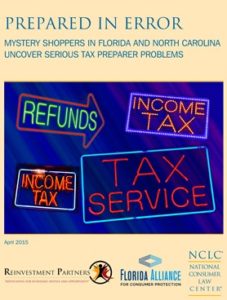Mystery Shoppers in Florida and North Carolina Uncover Serious Tax Preparer Problems
Advocacy groups in Florida and North Carolina conducted 29 “mystery shopper” tests of paid tax preparers. As with previous studies of paid preparers, test results shows the dire need for regulation of paid tax preparers, and the costs to both taxpayers and the U.S. Treasury due to the lack of minimum standards.

Published April 9, 2015 || National Consumer Law Center©
Download Report (PDF)
Model Individual Tax Preparer Regulation Act (model state law)
Riddled Returns: How Errors and Fraud by Paid Tax Preparers Put Consumers at Risk and What States Can Do, March 2014
Previous tax preparer mystery shopper reports (see Special Reports)
Overview of Testing
Testers used one of two scenarios – the Single Parent and the Graduate Student.
Single Parent scenario
The tester in this scenario was not entitled to claim the minor child because the child lived with the other parent for more than 50% of the time.
- 8 of the 15 preparers had the tester claim the child on the tester’s tax return, improperly inflating the tester’s refund and claiming an Earned Income Tax Credit (EITC) of $2,523.
- 7 of these 8 preparers also appear to have knowingly provided incorrect information on an EITC-related form.
Preparers also gave the Single Parent testers questionable advice, such as telling the tester she should work out an arrangement with the father to take turns claiming the child in alternate years.
The Single Parent scenario also involved $800 in side income not reported on a W-2.
- 12 of the 15 preparers did not report the $800 in side income.
Graduate Student scenario
The Graduate Student scenario involved a paid internship at a local nonprofit. All of the preparers properly reported the tester’s income. However, preparers did make errors with this scenario.
- 10 of the 14 preparers did not properly use a Schedule C to report the income. This resulted in omitting nearly $1,300 in self-employment income.
- Of the 4 preparers who did use a Schedule C, 3 preparers took questionable deductions, including 1 preparer who made up $9,562 in fictitious businesses expenses.
Overall Observations
In total, there were documented inaccuracies in the vast majority of the tests.
- 27 out of 29 returns prepared for the mystery shopper tests contained an error. Thus, over 90% of the returns were inaccurate.
Other problematic issues observed include:
- Preparers who forged the signatures of other people or otherwise failed to properly note on the tax form that they were the paid preparer who had completed the form.
- The testers were unable to obtain estimates of tax preparation fees in some cases. In one case, the preparer appeared to vary the amount of the fee on the refund amount, which is contrary to IRS rules.
- Preparers who were unfamiliar with the tax preparation software or common tax forms, or behaved unprofessionally.
Additional Resources
New America: Improving the Tax Preparation Experience, February 2015
Consumer Federation of America: Protecting Consumers at Tax Time: Federal and State Efforts to Address Common Problems Associated with Paid Tax Preparation, January 2015
U.S. Government Accountability Office: Paid Tax Return Preparers: In a Limited Study, Preparers Made Significant Errors, GAO-14-467T, April 8, 2014
